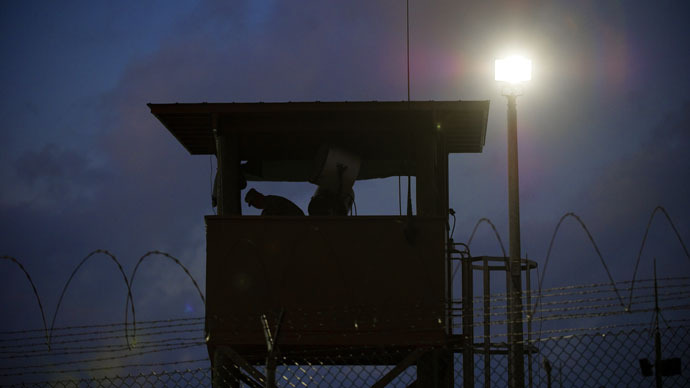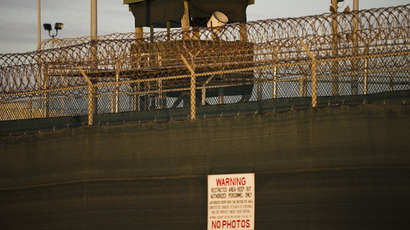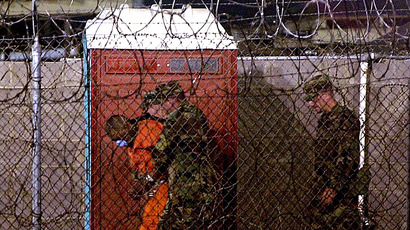Gitmo hunger strike: ‘The last right of people who don’t have rights’

Feroz Abbasi spent several years in extrajudicial detention at Guantanamo - two of them in solitary confinement - before being released without charge. He took part in the previous mass hunger strike and shared details of his experience with RT.
RT:Your time in Guantanamo. How were you treated there?
Feroz Abbasi: In Guantanamo, because I can speak English, I was treated better than the other detainees. So, those Arabs, who didn’t speak English, who came from a different culture, were treated harshly, very harshly. But my treatment wasn’t so much physical, we did get beatings, when we were transferred from camp to camp, it was psychological. So, for some reason on the same night when Iraq was bombed in March 2003, I was moved into isolation, solitary confinement, and I was there for two years. Six months of which were without sunlight.
RT:The fact that you could speak English. Did you pick up anything that other people didn’t understand?
FA: Yes. Because I understand the language and the soldiers assumed that everyone didn’t understand English, so it was kind of an advantage. And there was a period of time when I pretended to be Arab and did not speak English. I can’t remember how many months it was – maybe three. And therefore I could negotiate more around the camp – understanding what was going on, understanding the phrases of soldiers, when they expressed them, without them knowing.
‘US administration had learned from the first hunger strike’
RT:Were you there during hunger strikes? Did they achieve anything during your time?
FA: The first hunger strike was in camp X-ray and that was because of desecration of the Koran. Someone’s cage was being violently searched and the Koran was kicked by a soldier – this was in one of the blocks, which was away from us. And this was the last straw in what was accumulating abuses. And that being the case – and the hunger strike was the response. It started with the last British resident leaving Guantanamo Bay. He, who came from a very conservative background, told the Arab detainees, that this is what they needed to do, because this was IRA and some loyalist in the Northern Ireland. So, he took it right from there and told them that we need a hunger strike. We need to make a stand, to protest for our rights – at that point of time they didn’t believe him, they didn’t listen to him. But seeing the effect, the experiencing at camp X-Ray, they realized that this was the only option that they had and it was the last right of all the rights being taken away from them.
RT:Was there anything that you took part in?
FA: Coming from a different point from the Arabs and not being limited to my Arabic language I wasn’t much included in a circle, in discussions and so forth. And my position was that the Islamic doctrine tells us that you are not allowed to self-harm. We are not allowed to self-harm in that situation, so in terms of a hunger strike you harm yourself, you harm your body, and suicide – the same – you are harming yourself. So, this is not something that you would do. So, I didn’t participate in the first hunger strike. The second hunger strike (there were also other things - I didn’t like speaking to the interrogators, because they were asking the same questions over and over again, I was giving them the same answers, they did not believe me), so they said no talking and cooperation was to be limited.

RT:And results? Was it useful tactically?
FA: Surprisingly, in the first hunger strike there was a result. And from there it seemed it was the impetus for the next hunger strike. But unfortunately the American administration had learned from the first hunger strike and then the whole trajectory of how many people came onboard, how it starts, and where they fall off - they took that knowledge into the second and, I believe, the third hunger strike.
RT:So, that’s why this one is lasting so long, because they know how to deal with it?
FA: Basically yes. So, they formulated a way of dealing with it. They looked into the first one and took the measures to deal with it as best as they could. So, in terms of the effect later on, I am not sure of the impact on the conditions at Guantanamo Bay, detainees over there.
RT:With this particular strike – why are they being treated like this and what are those ways of dealing with the hunger strike?
FA: What I understand to be in the media it’s the desecration of the Koran again and it must be the last straw in the abuses they have to suffer. That’s why they are on a hunger strike again. I believe this is a protest. They are protesting. And this is their last right. Otherwise that right is being taken away from them. They don’t have the right to remain silent during interrogations. So, this is the last right of people who don’t have rights. They are protesting against the situation, but primarily because their religion is being abused.
RT:Is there only force-feeding or are there any other methods to try to stop the strike?
FA: All I know about force-feeding, they were trying to put in fluids into you. I don’t know how much fluid we should have got, but they were giving us some five or six times a day. Craziness like that! Actually, when I went to the medics, because I was pretending not to speak English, I could hear everything they were saying, there was one guy, who was doing a trainee medical course and he was joking about which needle to use: whether to use a big one or so forth. So, we were like guinea pigs for their training. The person, who was putting a needle into me – they took a long time – I mean they took a lot of stabs into my arm – they missed the vein until they actually found it. The medical capacity of these people is limited. So, in terms of that when I was there, when I was participating in a hunger strike – they intervened, but what I actually hear from people about force-feeding them through the nose, giving them some nourishment drinks or something for medical purpose and trying to keep them alive, as they say.
‘Gitmo cages became darker’
RT:Conditions. Have they got worse or improved since you left?
FA: From my experience the situation progressively got worse. In camp X-Ray there were cages, they looked like animal cages. There was an element of nature, there was an element of sunshine, there was an element of talking, communication with other detainees. But progressively the cages became darker, they became more excluded, they became more closed-off from the world – from the sky, from the sun, from the moon. Everything was being isolated in a very strict situation, which really affects person. So, it seems that Guantanamo is going that way and they are getting even worse in terms of isolating people. The enemies are around them.
RT:There were reports of a suicide attempt. Were you there? How desperate people must be to lead to that?
FA: There is an element of sometimes going through some rough parts. Someone who gets desperate in a way, they would find it hard in Guantanamo. But in terms of Islamic doctrine you can’t self-harm. And that’s very strong. And that’s basically what detainees have left – their religion. They seem to have nothing else. And they are not going to sacrifice, for instance, going to hell as we believe – to sum up those conditions in Guantanamo Bay. Because the Guantanamo Bay is obviously better than hell. So, I mean they can make the threat, they may faint. But in terms of them taking their lives of their own – I don’t believe them.
RT:And they are saying he has gone off the radar, gone missing. Is that a common occurrence?"
FA: I was in the blocks with population until March 2003 and I went missing. And they took me to isolation for two years. The other detainees didn’t know where I was. They didn’t know what happened to me. They didn’t know whether I was alive or dead. So, in terms of my case this could happen. You can be taken somewhere else, and they kept me there for a very long time.
RT:Did anybody know where you were?
FA: At the end (around the end of 2004) we got some legal representation, but they can play the games, so they can pretend such and such person doesn’t want to see a lawyer and so forth. And they can play these games around so a person can’t even see any representative.
‘No way would minority go on a hunger strike’
RT:US officials say there are 42 people on the strike. There are claims from legal representation that the number is a lot higher. Have you any idea of how many people are on that strike?
FA: Arabs work together, so it won’t be 42. They work together, so there’ll be a majority. There’s no way that a few people would go on a hunger strike unless they are very isolated – in this case it could be maybe six, or three of four. If they say 42 – it’s definitely the majority – 166.
RT:Psychologists have raised the alarm since it went past the two months, saying that detainee's condition is critical. They’ve demanded an independent investigation. Do you think that's likely at all?
FA: No. An independent investigation in Guantanamo is unlikely. The only people who are allowed in is the Red Cross. And unfortunately they failed us in Guantanamo Bay. Hopefully, they will learn from their mistakes and transfer that kind of knowledge to other kind of operations they have. But in terms of anyone who is allowed in Guantanamo Bay, it’s always in favor of the US administration and they will toe the line.
RT:So, Red Cross was compromised because they had to bow to the US administration?
FA: I believe the Red Cross believed that we were terrorists and they didn’t help us and actually worked against us.
RT:Is that possible whoever would come and wouldn’t be affected in the same way?
FA: When I was there I wanted someone from Amnesty International, someone to speak out and tell the world what was happening to us, but that’s unlikely to happen.
RT:Why aren’t they doing what they are for?
FA: Amnesty international?
RT:Yes.
FA: Because they are not allowed. The US controls the Guantanamo Bay, it’s a military institution and they don’t allow someone to come in there and criticize what they are doing. Red Cross doesn’t criticize – so they are allowed. Anyone who is allowed has to be kind of compliant in a way. Although, lawyers have been allowed, who have spoken out, some military lawyers, which we are thankful for. But those are individuals – not really organizations.
RT:There are street protests planned for this Thursday. Do you think they will achieve anything?
FA: In terms of policy changes or impact on Guantanamo Bay and the administration – they tend to be hard-headed and stubborn, but the detainees will appreciate it. All they want is to be heard, to see that people or feel the people actually offering support and see that they are suffering and they are crying out. In terms of moral support the detainees will appreciate it.














